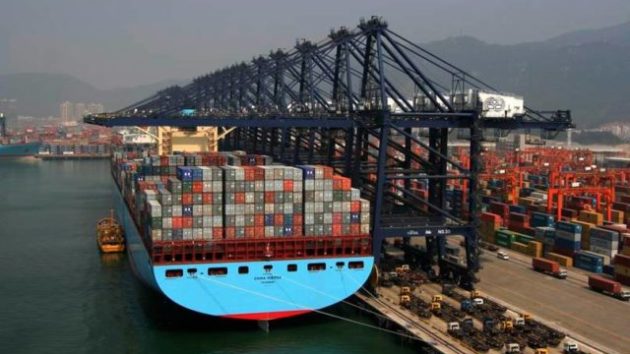We could have shipping containers full of foreign nukes in our ports and not know it
Two occasional papers were recently published by the Center for Security Policy. The first, entitled “What Could Possibly Go Wrong?,” was published in late 2016. The second, “The Perfect Storm,” was published in 2017. Both papers describe a 35-year lease to a cargo container terminal on the eastern seaboard of the United States. The peculiar discoveries in the papers made by investigative journalists Mary Fanning and Alan Jones have not received the national media attention they warrant.
In 2014, the United Arab Emirates (UAE)-based company Gulftainer was awarded a three-and-a-half decade lease to operate the cargo container terminal at Port Canaveral, Florida. The peculiarity of this acquisition rests on the fact that Gulftainer is co-owned by the emir of Sharjah, UAE, and Dr. Jafar Dhia Jafar, who is the brother of Saddam Hussein’s nuclear mastermind. During Operation Iraqi Freedom, Dr. Jafar was an official of the Iraqi regime who could have been engaged as a military target.
Why is this alarming? In part, it is because Dr. Jafar has also been credited with the design of a miniaturized nuclear weapon, commonly known as the “Beach Ball.” North Korean dictator Kim Jong-un has appeared standing by a similarly purported nuclear weapon in recent photographs. This type of nuclear weapon can easily fit inside the nosecone of an intercontinental ballistic missile (ICBM) and can cause the kind of catastrophic damage the United States has never seen.
The danger to America is not just that Gulftainer is co-owned the family of Saddam Hussein’s top nuclear mastermind, Dr. Jafar, and the emir of Sharjah, but also that Gulftainer is also in a joint venture with Kontsern-Morinformsistem-Agat, the Russian company that makes the Club-K missile launch system. The Club-K system looks identical to standard ocean containers that are shipped by the billions all over the world. The alarming difference between the ordinary cargo containers is evident by what’s found on the inside of the Club-K containers. Four cruise missiles are housed in each Club-K system and can be launched directly from the container – even remotely.
How many Trojan horses have our enemies shipped around the world? Such an entry into any of our ports would be considered astronomically valuable to any enemy of the United States. Have some of these dangerous containers made their way to America? These are viable questions.
Though speculative, the numbers could be staggering. Some ships hold as many as 3,000 cargo containers. “Relying on intelligence and risk analysis,” Van Hipp tell us in his book, The New Terrorism, “we are only able to scan less than one percent of the incoming containers before they enter the country.” Do the math, and that’s 30 or fewer containers scanned per 3,000. The potential for a national security threat to be offloaded at Port Canaveral or any other port around the country is alarming. These 40-foot shipping containers could be carried by semi trucks or freight trains anywhere around the country without raising a single eyebrow.
If a Club-K missile attack were to happen, the results could be cataclysmic. Each hidden missile could carry any number of conventional payloads, including those poised for a biological, chemical, electromagnetic pulse (EMP), or nuclear attack.
Clare Lopez, vice president for research and analysis at the Center for Security Policy, says, “We have no idea how many of those might be already among container traffic in the world.” This is rightly disturbing for us, as millions of Americans have unknowingly put their trust in the Committee on Foreign Investment in the United States (CFIUS) review and oversight process, or probably have never given it any thought regarding safety.
Ordinarily, the CFIUS would determine whether or not any kind of foreign purchase, acquisition, or lease like this one could have some kind of national security implication. A failure of the review and oversight process is not out of the question, considering the utter failure of the Uranium One case, which occurred in the same time period. Lopez confirms, “It speaks to a lack of oversight during the Obama years, particularly of the CFIUS body that has the responsibility for oversight over deals just like this. Either they didn’t pay enough attention to it or they just let it go just like the Uranium One deal, but of course, there we know there was all kinds of malfeasance involved, including corruption, extortion, blackmail, kickbacks, and payments to the Clinton Foundation.”
According to Lopez, “Gulftainer is seeking similar cargo container terminal leases at least 42 other U.S. ports.” Roadways and railways extending from Port Canaveral could be giving our enemies access to the entire country.
Media and layperson alike should be compelled to bring this to the attention of those in Congress, particularly to those who are members of the House Transportation Committee. Could we be on the brink of disaster without even knowing it?
ABOUT J.M. PHELPS
J.M. Phelps is a Christian activist and journalist based in the Southeastern U.S.
EDITORS NOTE: This column originally appeared in the American Thinker.



Leave a Reply
Want to join the discussion?Feel free to contribute!